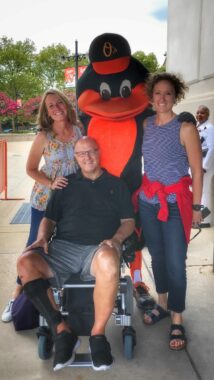What Lou Gehrig taught us about life, decades after he died
After an ALS diagnosis, a columnist's late husband turned to a baseball legend
Written by |

The first text message my late husband, Jeff, ever sent me was just one word. We’d had our first date the previous evening, and our dinner at a sidewalk restaurant on a mild autumn evening in Alexandria, Virginia, was full of laughter. I was happy to see his text the next morning, which I assumed would be to say hello. Instead, his message simply said, “Tigers.”
I didn’t quite know how to respond to “Tigers,” so I waited. Sure enough, he sent me a second message explaining that the previous one had been meant for a group chat with his brothers. The Detroit Tigers baseball team was playing that day, and it was his pick to win.
As I got to know Jeff better, I learned about his enduring love of baseball, a passion he shared with his family. Growing up in Michigan, Jeff and his siblings had attended countless Tigers games or listened to them on the radio.
As our relationship grew, we started attending games together, too. We’d go see the Washington Nationals most often, but we also saw minor league games. We liked those because we could sit right behind home plate and watch the action up close for just $17 a ticket. During games, Jeff would gently feign exasperation at my relative lack of sports knowledge, but he was happy to share his enthusiasm with me. Attending baseball games together became a favorite pastime for us.

From left, Juliet, Jeff, and their friend Andrea at a Baltimore Orioles game in 2019. (Courtesy of Juliet Taylor)
When Jeff was diagnosed with ALS in October 2018, we were racked by disbelief and sorrow. In those quiet and shellshocked days, I noticed that he turned to the late New York Yankees legend Lou Gehrig as a source of inspiration.
ALS is also commonly known as Lou Gehrig’s disease, as Gehrig was diagnosed with it in 1939 and died two years later. Known as the “Iron Horse” because of his consistent play, Gehrig held the Major League Baseball record for most consecutive games played — 2,130 — until he voluntarily stopped after ALS weakened his performance. He is widely viewed as one of the greatest baseball players of all time and was the first MLB player to have his number retired.
While Gehrig’s sports prowess and exceptional career are admirable to this day, he’s most often lauded and remembered for his grace and courage in the face of this devastating disease. During his on-field retirement speech on July 4, 1939, at Yankee Stadium, he shared with fans and fellow players that while he “might have been given a bad break … I’ve got an awful lot to live for.”
Inspired by this, Jeff approached ALS with the same perspective and attitude. He noticed how Gehrig applied the same fortitude to ALS as he did to baseball and that Gehrig set the tone for how he wanted to live with his disease. Jeff did the same.
Just a few weeks after Jeff’s diagnosis, we made the journey back to Detroit for Thanksgiving, where members of his large and close-knit family were eager to see him. Just before we sat down to dinner, Jeff paused, asked for everyone’s attention, and gave his own speech to our assembled loved ones. I don’t remember each word, but we were all moved by his primary message: “We are going to live.”
In that moment, Jeff wasn’t talking about physical survival. Unfortunately, ALS carries the same fatal diagnosis today that it did when Lou Gehrig was stricken nearly 85 years ago. What Jeff meant instead was that we were all going to live — to embrace life, to enjoy, to create and celebrate moments, to have experiences, to love. He directed how he wanted us to approach living with ALS, and we, his family, understood. His words provided a road map for the next 19 months as we navigated his illness, making memories and beautiful moments along the way.
Living with ALS is terrifying, exhausting, and surreal. It’s wrenching to witness the physical weakness and deterioration of our loved ones. And yet, there are moments of beauty, wisdom, peace, and overwhelming love. For those, I credit Jeff. Jeff showed us how to live, and I suspect that Lou Gehrig showed him.
In June 2021, Major League Baseball celebrated the first annual Lou Gehrig Day, now in its third year. I and thousands of others in the ALS community attend a local game on Lou Gehrig Day — June 2 — each year.
Baseball, and Gehrig, will now always have a piece of my heart — as a reminder of my happy marriage to a strong and determined man, as a tightknit community that honors and remembers its own, and as a force for helping to bring awareness and education about the need for ALS treatments and cures.
I hope that Lou and Jeff are together somewhere, guiding our fight to end ALS — a fight we must one day win.
Note: ALS News Today is strictly a news and information website about the disease. It does not provide medical advice, diagnosis, or treatment. This content is not intended to be a substitute for professional medical advice, diagnosis, or treatment. Always seek the advice of your physician or other qualified health provider with any questions you may have regarding a medical condition. Never disregard professional medical advice or delay in seeking it because of something you have read on this website. The opinions expressed in this column are not those of ALS News Today or its parent company, Bionews, and are intended to spark discussion about issues pertaining to ALS.







Glenn Lopez Cepero
Love the story.
Karen Roberts
Beautiful & heartfelt prose Julie. Thank you.
Lawrence Arthur Cunningham
Thank you HUGE baseball fan Season ticket holder to the red Sox for many years (all the good years 2004,07,13,18)
primary care taker for my ex (BFF) Appreciated this article very much
Larry
Leigh
What a lovely piece. Gehrig's life is an inspiration. Knowing how ALS will affect a loved one is so important. I found this article very helpful: https://abriohomecare.com/symptoms-and-stages-of-lou-gehrigs-disease/